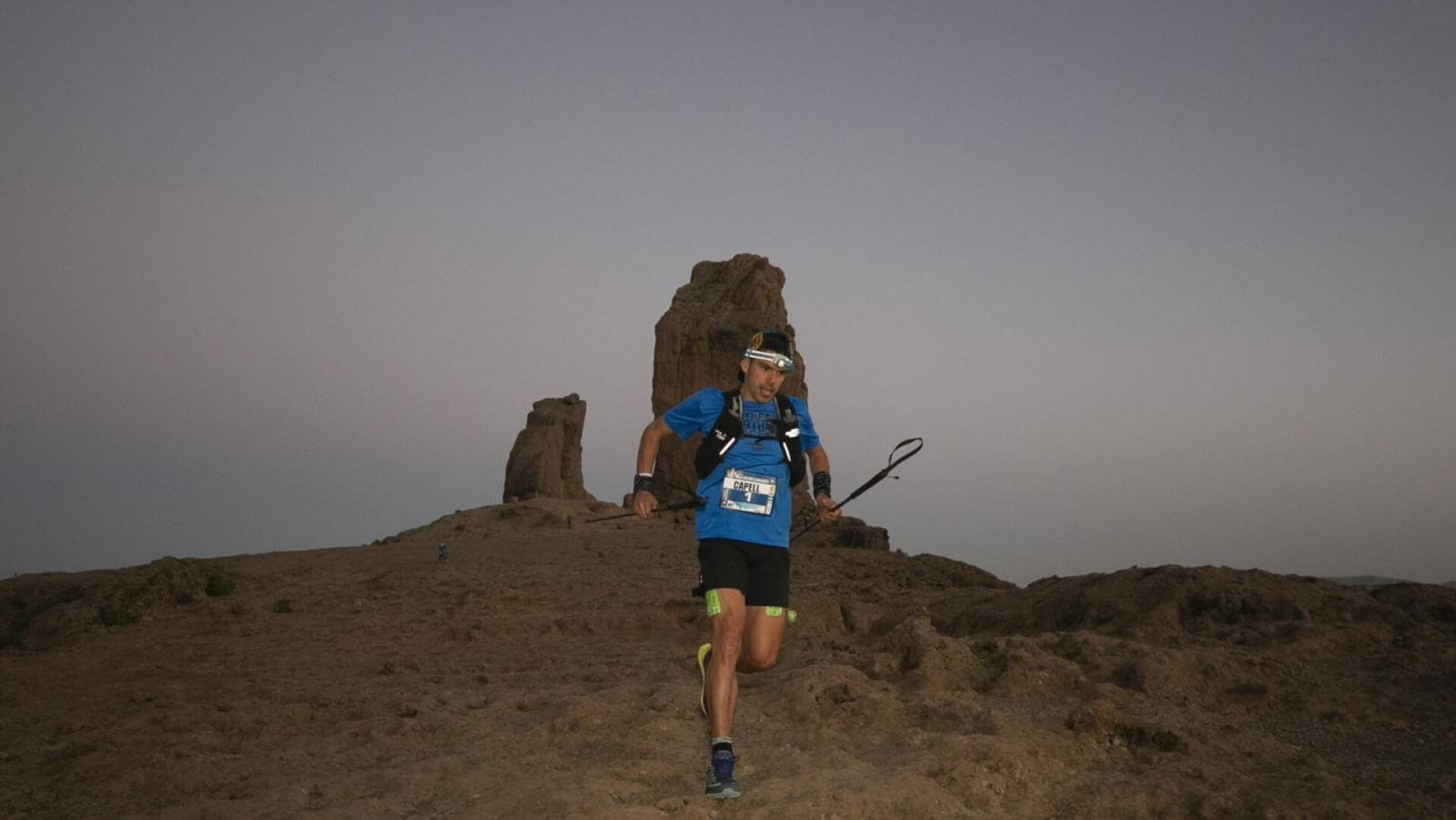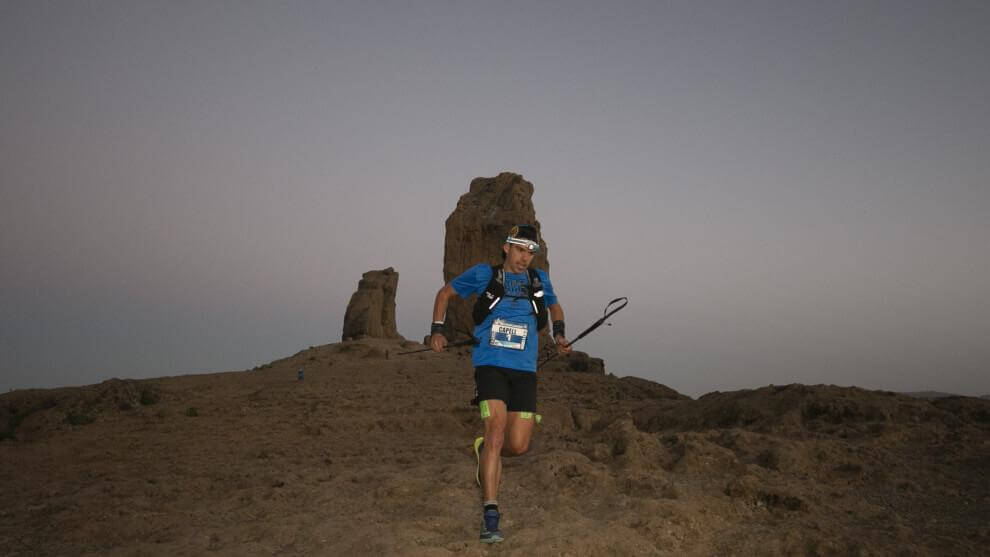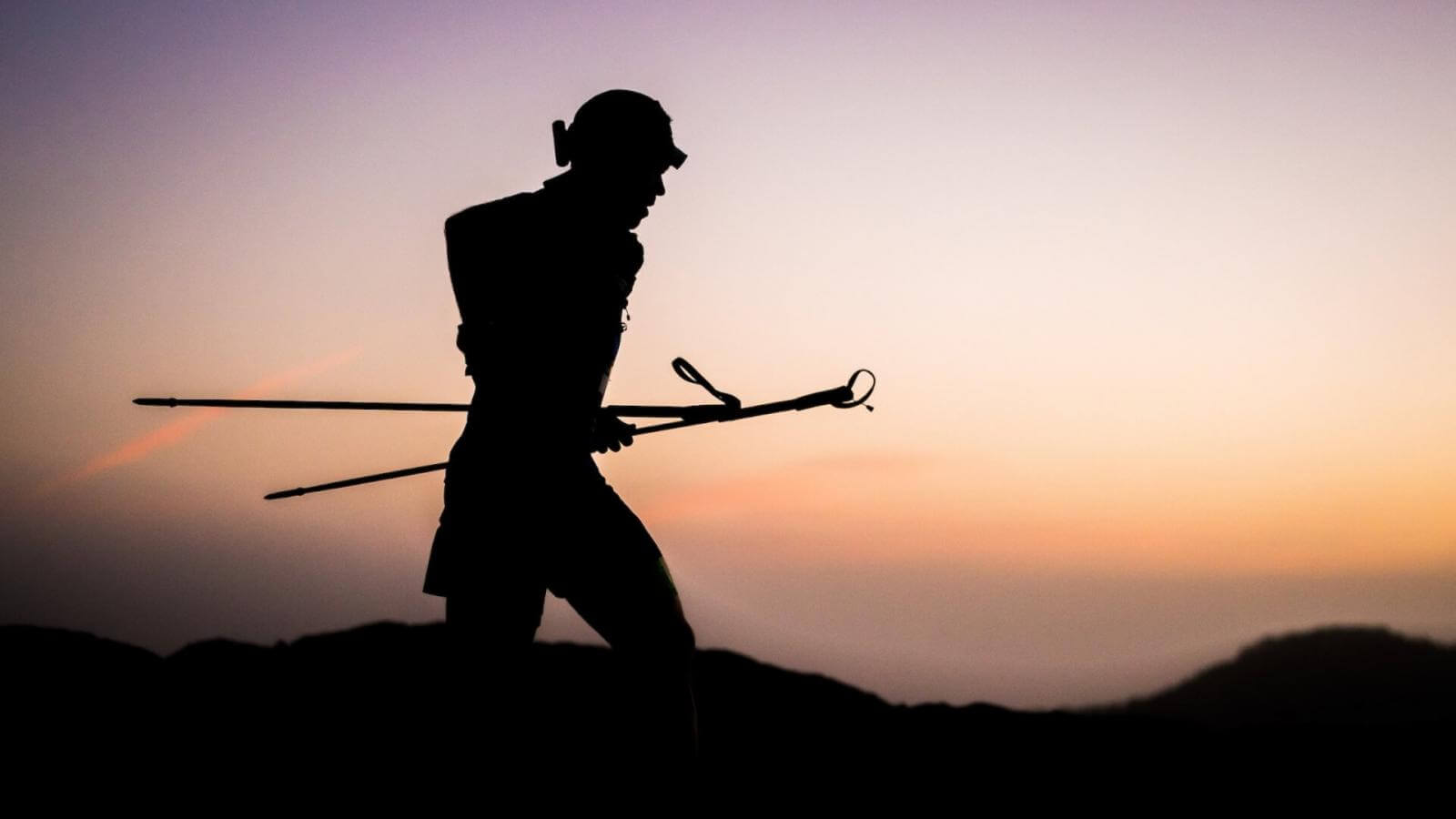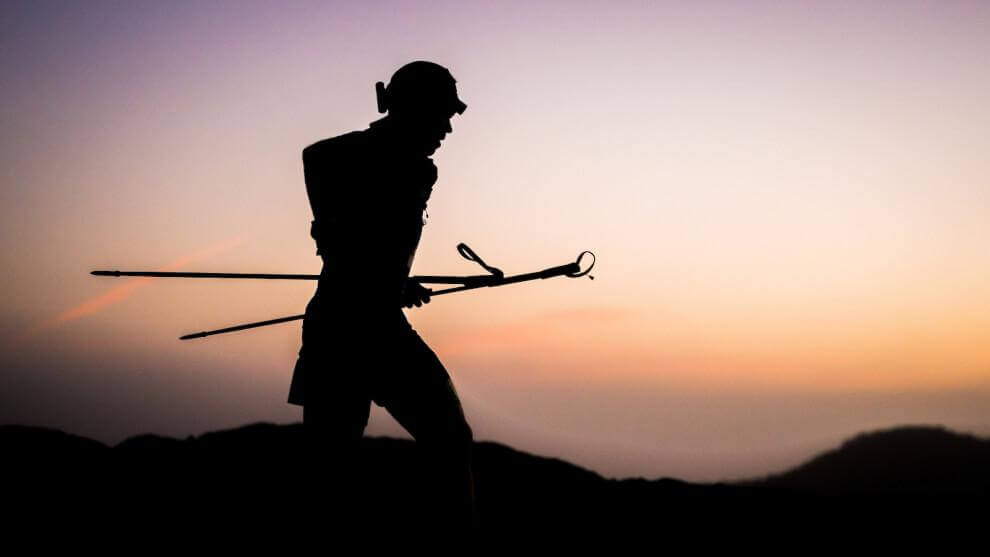Two-time winner of the Ultra Trail World Tour circuit, Spain Ultra Cup champion, winner of the Ultra Traildu Mont Blanc… Pau Capellis one of the most renowned names on the national and international trail running scene, a discipline he came to while recovering from an indoor football injury.
Enamoured of the Canary Islands, he has run in the Transvulcania in La Palma, triumphed in the Blue Trail in Tenerife, and won theTransgrancanaria four times – all remarkably demanding races with a high variability of terrain and climate.
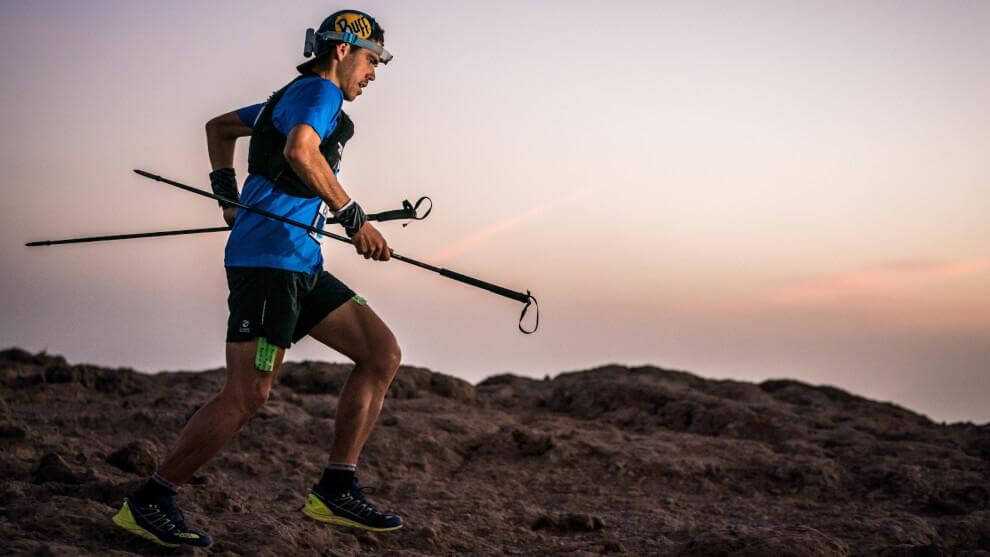
You introduce yourself as someone who is passionate about the sea, but who ultimately found peace in the mountains, and in many places around the world these two things are incompatible. Don’t you think you spend too little time in the Canary Islands?
To be honest, I would love to be here more, but that would mean spending less time with my family, with the stability I have when I am at home, my routines… But regardless of that, I try to make the very most of my time when I am on the islands, however short that time may be.
Winner of the Ultra Trail World Tour circuit in 2018 and 2019, Spain Ultra Cup Champion… you say that you ended up in the mountains because you went there to recover from a ruptured ligament and patella incurred while playing five-a-side football. What can you tell us about when you started out on the Trail?
I started running because of an injury, an anterior cruciate ligament rupture and patella suture, from playing indoor football. I recovered well after the operation, and then the doctor recommended I go running in the mountains to speed up my recovery, because of the type of terrain. The first time I did it was magical, something I didn’t expect. A sensation of freedom I had never felt.
From then on, it was 100% experimental. I went out every daywithout any precise plan, just to discover things, to have an adventure, and I got hooked. Over the years I evolved, I managed to complete my engineering degree and learn training methods at the same time, so now I can devote myself to this sport full-time.
I am still studying on the only Master’s degree in trail running in Spain, which is certain to help me grow a little within the trail runningworld.
There are two parts to long-distance running: the part you can control, and the part you can’t control. Over the years, you learn that all you have to focus on is the part you can control. The other part doesn’t depend on you.
Numerous factors come into play on long-distance races which influence the runners’ performance. What would you say are the most important ones to bear in mind? Which ones have tested you the most when competing?
There are two parts to long-distance running: the part you can control, and the part you can’t control. Over the years, you learn that all you have to focus on is the part you can control. The other part doesn’t depend on you.
I my case, I leave the part I can control (resting, actual training, nutrition, supplements for races, gels, etc.) in the hands of professionals (I have a doctor, a coach, a nutritionist, etc.). What I can’t control, like the weather, a change in the raceroute, personal problems in the days leading up to the contest… Well, I try to put that aside, so that I am only affected by what I can resolve during the race.
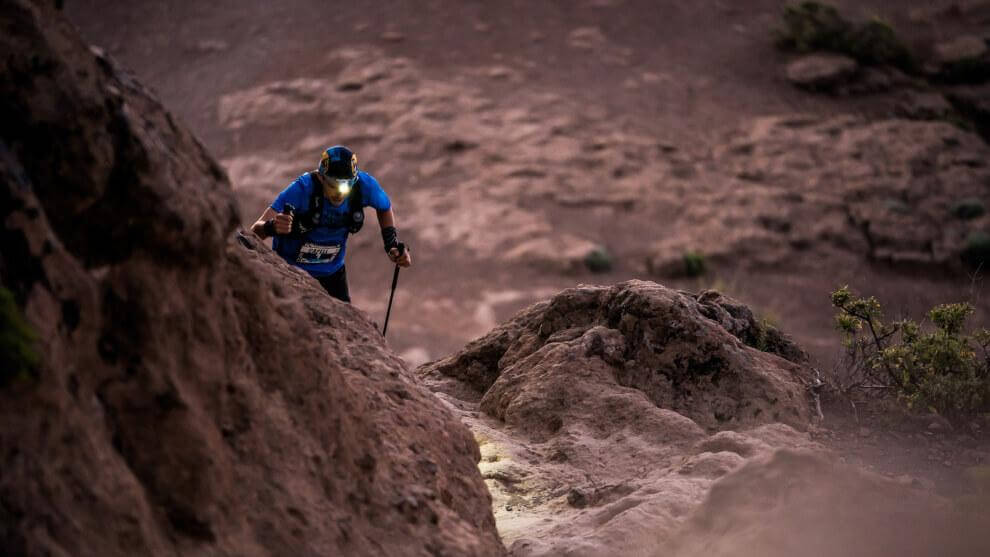
How does a long-distance runner plan the season? Tell us about your training programme and the importance of training camps for staying at the highest level.
I plan my seasons based on major objectives, of which there may be three or four as well as secondary races, which are supposed to serve as training. When I run in them, I try to give 100% of myself, but I know it doesn’t matter if I drop my pace or don’t finish, because at the end of the day they are just for training.
I do my planning at the start of the year, by taking a stress test, when I see what level I am at and I schedule the training volumes to attain a high performance level in my competition. These three or four races a year are 120-160 km each in my case, while the shorter ones, of which there may be six or seven during the season, are distances of 40 to 60 km.
In 2019, you won the Ultra Trail du Mont Blanc, seen as the most important trail in the world, after winning theTransgrancanariafor the second time.What do you think are the demands of a race like the Transgrancanaria that make it a UTMB qualifier? What sets it apart from other competitions?
The most important thing is that it is the first race of the year. It’s the first showcase for the runners. If you run a good race in the Transgrancanaria, you’re on the starting blocks of the season as one of the runners in the best shape at the start of the year, and that generates respect both towards others and towards you. And it also makes you feel confident enough to continue the season.
TheTransgrancanariais great fun. It’s a race with a lot of temperature changes, and it’s demanding because it has leg-breaking ground, constant descents, stretches with elevation gains of 1000 metres, and the terrain is very variable. This makes the race great fun, something runners are extremely grateful for in long distance, because when you run for so many hours the last thing you want is to get bored.
The competitive panorama of the islands offers some very demanding events and attracts great international runners. You have run in the La Transvulcania in La Palma, triumphed in the Blue Trail in Tenerife and won theTransgrancanaria four times. What makes each one special, and what similarities do they share that put them on the calendar of professional runners?
The weather is normally good. The islands have a lot of altitude variety if we compare them to other islands like the Balearics, for example. And you can spend a few days winding down with the good climate and great weather here.
When we compete, we don’t only come for that – we engage in sports tourism at the same time. We look for places where we can eat well, with reasonable prices, where the family can go... and the Canary Islands have all that.
When we compete, we don’t only come for that – we engage in sports tourism at the same time. We look for places where we can eat well, with reasonable prices, where the family can go... and the Canary Islands have all that.
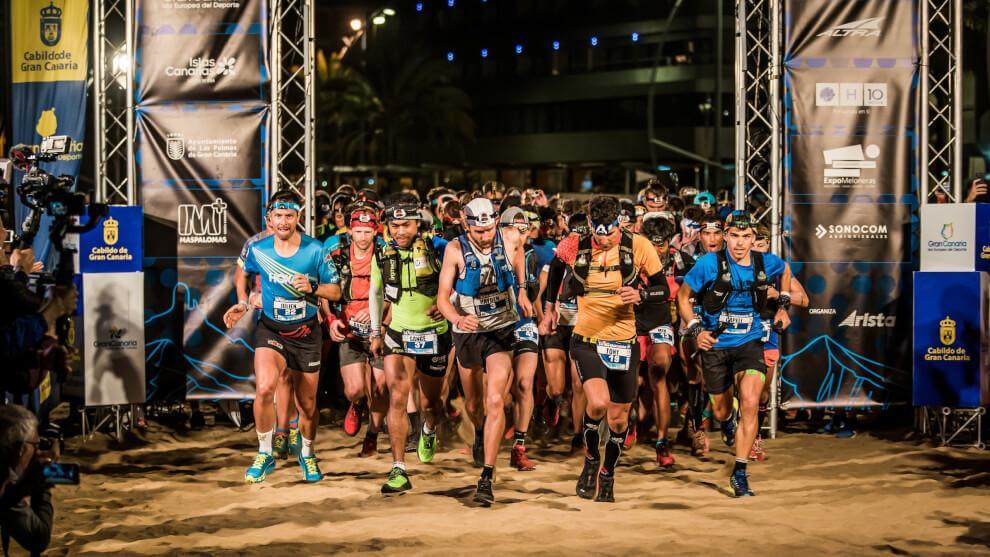
In your documentary “Run for the Artic”, where you disruptively reveal a direct consequence of climate change, you speak of how important it is for you to travel, and live out new sensations and experiences. We know you are an old friend of the Canary Islands but once they were new to you. With this in mind, could you tell us of an experience or feeling that you had for the very first time in the Canary Islands?
My first experience was in El Garañon, on Gran Canaria. On my first trip to the island, to take part in theTransgrancanaria, I stayed there, and I remember it very fondly.
I was starting to become professional and I felt loved, and also I was really surprised by the radical change between the cold of that area, the drizzle when you reached Pico de las Nieves, and the sunshine at the end, in Maspalomas. I wasn’t ready for that, I had different expectations and what I experienced was truly beautiful.
Let’s finish up with a few questions that aren’t about mountain races:
How would you define the Canary Islands, in one word?
Tropical. Because you have many different climates on each island. No two islands are the same and normally the climate is quite tropical (it rains in the mountains, there is plenty of sunshine on the beach…).
What would you say is your favourite place on each of the islands you have visited?
On Gran CanariaI always think of Tejeda, because it transmits so much peace to me. On Tenerife it is Teide, and on La Palma, Roque de los Muchachos. They are spectacular areas, where you can actually see the island better.
Your top 3 Canarian beaches
El Socorro beach, on Tenerife, because that was where I did the Teide project;Maspalomas, because I always train there; and Puerto de la Cruz, where the Bluetrail ends.
What are the things we must not miss on the Canary Islands?
The races, I think. Because of the organisation, which is superb and ensures you have a unique experience. If you want to get to know the Canary Islands, what better way of doing so than by travelling to compete and see the sights at the same time?


